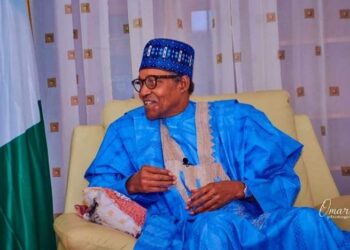As news of President Muhammadu Buhari’s passing filtered through the land, the silence that followed in Borno was not merely one of mourning — it was the silence of deep reflection. For to us, Buhari was not just a former president of Nigeria. He was ours. He was a son of the North-east, a former governor of our larger zone, a wartime General who held Borno close to his heart, and a leader who, despite all odds, remained steadfast in his mission to see peace return to our troubled soil.
A Bond Forged in Service
The bond between Buhari and Borno was forged not in campaign rallies or political deals, but in service. As the military governor of the then Northeastern state in 1975, which comprised the present-day Borno, Yobe, Bauchi, Adamawa, Gombe, and Taraba states, Buhari earned a reputation as a no-nonsense administrator who led with discipline, vision, and humility. He traversed the length and breadth of the zone, laying foundational structures in education, security, and public accountability, most notably, through the establishment and support of rural health and water schemes, road networks, and civil service reforms that impacted the lives of many in Maiduguri and beyond.
The Fight Against Corruption: From PTF to the Presidency
His integrity and passion for nation-building were again brought to light when he was appointed to chair the Petroleum Trust Fund (PTF) in the 1990s under General Sani Abacha. Through the PTF, Borno saw the construction of critical road infrastructure, renovation of schools, hospitals, and the delivery of essential drugs to the most remote communities. Despite working under a military regime with questionable legitimacy, Buhari’s handling of the PTF was praised nationally and internationally for transparency, efficiency, and accountability. Not a single credible accusation of personal enrichment tainted his stewardship.
As president (2015–2023), his love for Borno was again visible. On taking office, one of his first symbolic acts was to move the military command center to Maiduguri. This was not mere political theatre; it was a clear demonstration that he saw the pain of Borno and was ready to act. During his tenure, many local government areas that had fallen into the hands of insurgents were reclaimed. Refugees began to return. Soldiers were reequipped. Morale was restored.
It is true that the insurgency was not completely defeated. But who can forget his countless visits to Borno — not only during campaigns but during our hardest moments: bomb blasts, attacks, floods, and funerals. In contrast to the aloofness of others, Baba Buhari showed up. His presence gave the people courage.
A Leader Who Lived Like the Poor
Despite being Commander-in-Chief, Buhari lived simply. No flamboyant mansions. No offshore accounts. No mistresses, no flamboyance, and no private jets beyond official duty. His humility was legendary. His meals were basic. His wardrobe austere. Even in retirement, he returned to Daura not as a king but as a quiet villager among his people.
In Borno, we admired this. For a people who have lost so much to greed, violence, and betrayal, Baba Buhari reminded us that dignity is not in how much one steals, but how one serves.
On His Shortcomings: A Call for Forgiveness
And yes — like every man, he had his flaws. There were moments of silence when we expected him to speak. There were grievances about appointments, economic policies, and perceptions of favouritism. But we must ask: Were these failures of intention or failures of execution? Did he act in malice or from a place of imperfection?
In a time where leaders cling to power with desperation, Buhari stepped aside after two terms, refusing to amend the constitution, choosing instead to retire quietly. For this alone, he deserves our forgiveness, our respect, and our admiration.
A Legacy of Honour
Today, Borno stands not only as a symbol of resilience but as a witness to Buhari’s love. His investments in the Northeast Development Commission, his support for rebuilding infrastructure destroyed by war, and his defense of traditional institutions (including his close relationship with the Shehu of Borno) are testimonies of a man who never forgot where his leadership began.
To those who choose to vilify him in death, we say: pause. Reflect. Even our Prophet (SAW) taught us that the faults of the dead are buried with them, while their good deeds shine for eternity. Let us remember Buhari for what he was — a rare soul in our nation’s troubled political journey.
In Conclusion
We in Borno will never forget Baba Buhari. His footprints are in our streets, our hearts, and our prayers. In mosques and markets, schools and military bases, the mention of his name will echo not with bitterness but with reverence.
He may have died, but in the story of Borno — and in the story of Nigeria — Muhammadu Buhari lives on.
Dr. Zanna Hassan Boguma FCIPDM FWIP,
Zanna Boguma of Borno,
Maiduguri, Borno state
